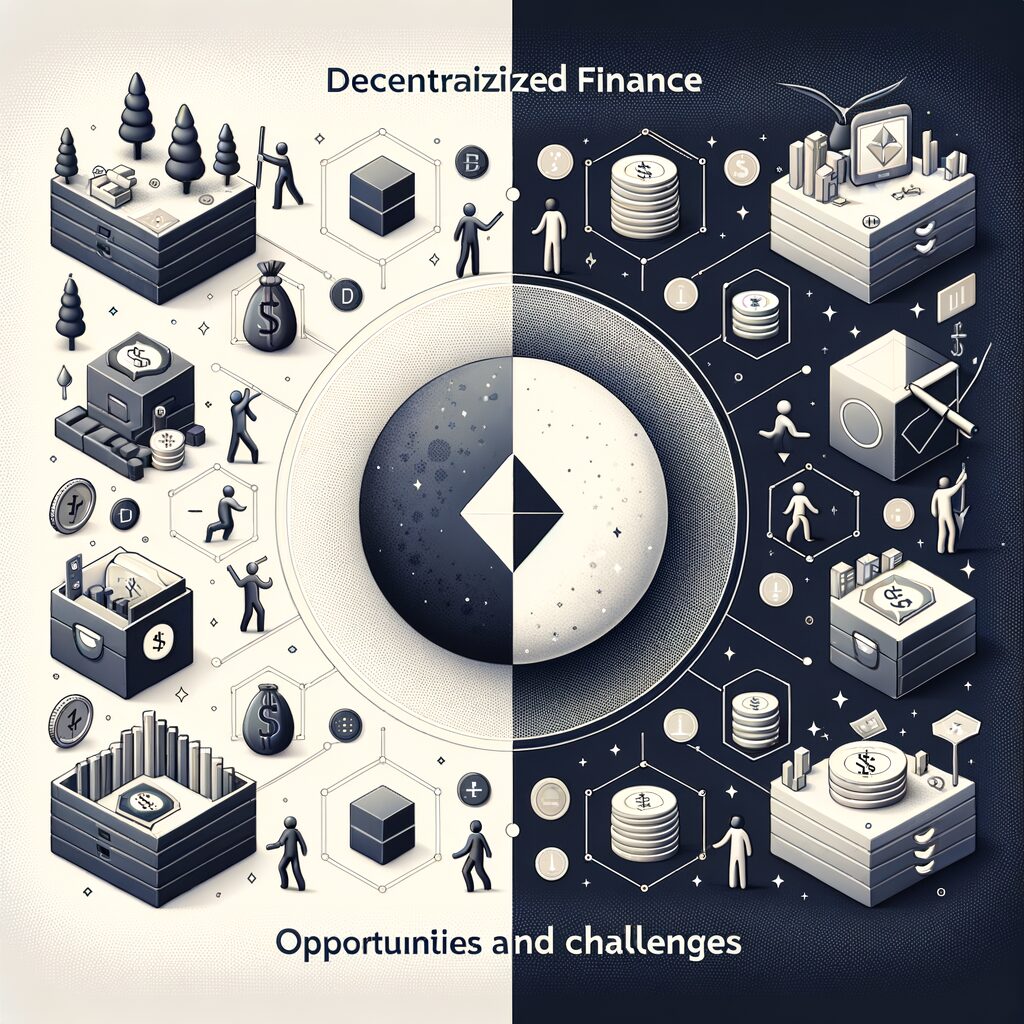
“Unlocking Finance: Navigating the Opportunities and Challenges of DeFi”
Understanding DeFi: A Comprehensive Guide to Decentralized Finance
Decentralized Finance (DeFi) Explained: Opportunities and Challenges
In the realm of financial innovation, Decentralized Finance, or DeFi, has emerged as a transformative force, challenging traditional banking and finance systems. DeFi refers to an ecosystem of financial applications built on blockchain technology that operates without the need for central financial intermediaries such as banks, brokerages, or exchanges. Instead, it utilizes smart contracts on blockchains, predominantly Ethereum, to execute financial transactions and services.
The core appeal of DeFi lies in its ability to offer financial inclusivity and democratize access to a wide array of financial services. By leveraging blockchain technology, DeFi platforms enable users to lend, borrow, trade, and invest through peer-to-peer networks, ensuring that transactions are transparent, secure, and fast. This open financial system is accessible to anyone with an internet connection, thereby potentially extending financial services to the unbanked or underbanked populations worldwide.
Moreover, DeFi presents opportunities for earning interest or yield through various mechanisms such as liquidity mining and yield farming. These innovative practices allow users to provide liquidity to DeFi protocols in exchange for interest payments or governance tokens, which can further be used within the ecosystem or traded on the market. This has led to the creation of complex financial instruments and the rapid growth of the total value locked (TVL) in DeFi protocols, signifying the amount of capital deployed in these systems.
However, the burgeoning DeFi sector is not without its challenges. One of the most pressing issues is the regulatory uncertainty that surrounds it. As DeFi operates in a largely unregulated environment, it poses significant risks to users due to the absence of consumer protection mechanisms. Regulatory bodies around the world are grappling with how to oversee these decentralized entities without stifling innovation or the benefits they offer.
Another challenge is the technical complexity and user experience. DeFi platforms can be difficult to navigate for the average user, with complex interfaces and a steep learning curve. This complexity not only hinders widespread adoption but also increases the risk of user error, which can lead to financial loss. Additionally, the nascent technology underpinning DeFi is not immune to bugs or vulnerabilities, which have been exploited in various high-profile hacks and scams, leading to significant losses for participants.
Furthermore, the scalability of blockchain networks is a critical concern. As DeFi platforms grow in popularity, the underlying blockchain infrastructure must be able to handle the increased transaction volume without compromising speed or inflating transaction fees. Solutions such as layer-two scaling and sharding are being developed to address these issues, but they are still in the early stages of deployment.
In conclusion, Decentralized Finance represents a significant shift in the way individuals and businesses can access and interact with financial services. It offers a plethora of opportunities for innovation, financial freedom, and inclusion. However, the challenges it faces, including regulatory scrutiny, technical barriers, and security concerns, must be addressed to ensure its long-term viability and success. As the DeFi space continues to evolve, it will be crucial for stakeholders to collaborate in creating a secure, efficient, and equitable financial ecosystem for all.
Navigating the World of DeFi Protocols: Opportunities for Investors

Decentralized Finance (DeFi) Explained: Opportunities and Challenges
In the ever-evolving landscape of financial technology, Decentralized Finance, or DeFi, has emerged as a revolutionary concept that is reshaping the way we think about and interact with financial services. At its core, DeFi represents a shift from traditional, centralized financial systems to peer-to-peer finance enabled by decentralized technologies built on blockchain networks. This paradigm shift offers a plethora of opportunities for investors, but it also comes with its own set of challenges that must be carefully navigated.
One of the most significant opportunities presented by DeFi is the democratization of finance. By leveraging blockchain technology, DeFi protocols facilitate financial transactions without the need for intermediaries such as banks, brokers, or insurance companies. This not only reduces transaction costs but also opens up financial services to a broader audience, including those who have been traditionally underserved by the banking sector. Investors now have unprecedented access to a global pool of assets and can engage in lending, borrowing, trading, and investment without geographical restrictions or the need for a middleman.
Furthermore, Deifi protocols offer a high degree of transparency and security. Since transactions are recorded on a blockchain, they are immutable and easily verifiable, which reduces the risk of fraud and corruption. The use of smart contracts—self-executing contracts with the terms of the agreement directly written into code—ensures that transactions are processed automatically when certain conditions are met, further enhancing the trustworthiness of the system.
Another opportunity lies in the potential for higher yields. DeFi platforms often provide more attractive interest rates for lenders and borrowers compared to traditional financial institutions. This is partly because the operational costs of running a DeFi platform are significantly lower than those of a conventional bank. Additionally, the use of liquidity pools, where users can supply assets to a shared pool in exchange for rewards, has introduced new ways for investors to earn passive income.
Despite these opportunities, DeFi is not without its challenges. One of the primary concerns is the regulatory uncertainty that surrounds it. As a nascent industry, DeFi operates in a legal grey area, with regulators around the world still grappling with how to oversee these decentralized systems. This uncertainty can pose risks for investors, as the lack of clear regulations may lead to abrupt changes in the legal landscape that could affect the viability of certain DeFi projects.
Moreover, the technology underpinning DeFi is still in its infancy and can be complex and difficult to understand for the average user. The learning curve associated with blockchain and smart contracts can deter some potential investors from participating in the DeFi ecosystem. Additionally, the nascent nature of the technology means that it is still prone to bugs and vulnerabilities, which have led to several high-profile hacks and losses of funds.
Lastly, the volatility of the cryptocurrency markets, which most DeFi protocols are built upon, adds an additional layer of risk. The value of assets locked in DeFi platforms can fluctuate wildly, which can lead to significant financial losses for investors who are not well-versed in managing such risks.
In conclusion, while DeFi offers a range of exciting opportunities for investors, including access to a global market, higher yields, and increased transparency, it also presents several challenges that must be carefully considered. Regulatory uncertainty, technological complexity, and market volatility are all factors that require due diligence and a measured approach. As the DeFi space continues to mature, it is likely that many of these challenges will be addressed, paving the way for a more robust and accessible financial ecosystem. However, for the time being, investors must tread cautiously and arm themselves with knowledge to successfully navigate the world of DeFi protocols.
The Rise of DeFi Tokens: What You Need to Know
Decentralized Finance (DeFi) has emerged as a transformative force in the financial sector, challenging traditional banking and investment models with its innovative approach to transactions and asset management. At the heart of this burgeoning ecosystem are DeFi tokens, which play a pivotal role in the operation and governance of DeFi platforms. Understanding the intricacies of these tokens is essential for anyone looking to navigate the DeFi landscape effectively.
DeFi tokens are digital assets that represent a stake in a DeFi protocol or platform. Unlike traditional financial systems that rely on centralized institutions like banks, DeFi operates on blockchain technology, ensuring transactions are transparent, secure, and immutable. These tokens often grant holders certain rights within the ecosystem, such as voting on protocol changes or claiming a share of the platform's fees. As such, they are not merely a means of investment but also a tool for participating in the decentralized decision-making process that defines DeFi.
The allure of DeFi tokens lies in their potential to democratize finance. By leveraging smart contracts—self-executing contracts with the terms of the agreement directly written into code—DeFi platforms can offer services such as lending, borrowing, and trading without the need for intermediaries. This automation reduces costs and increases efficiency, allowing users to interact directly with each other in a trustless environment. Consequently, DeFi tokens have become a popular investment for those seeking to capitalize on the growth of these platforms and the broader DeFi ecosystem.
However, the opportunities presented by DeFi tokens come with their own set of challenges. The nascent nature of the DeFi space means that it is subject to high volatility and regulatory uncertainty. The value of DeFi tokens can fluctuate wildly, driven by market sentiment, technological developments, and the evolving regulatory landscape. Investors must therefore exercise caution and conduct thorough research before participating in DeFi markets.
Moreover, the decentralized aspect of DeFi can be a double-edged sword. While it eliminates the need for intermediaries, it also means that there is no central authority to turn to in case of disputes or technical issues. Users are solely responsible for their investments, and the irreversible nature of blockchain transactions can lead to permanent loss of funds if mistakes are made. This level of responsibility requires a degree of technical knowledge and vigilance that may be daunting for newcomers to the space.
Security is another significant concern in the DeFi ecosystem. The code underlying DeFi platforms and tokens is complex, and vulnerabilities can be exploited by malicious actors. High-profile hacks and exploits have resulted in substantial losses for DeFi users, highlighting the need for improved security measures and risk management strategies within the industry.
In conclusion, DeFi tokens represent a revolutionary shift in the way we think about financial services and asset ownership. They offer unprecedented opportunities for participation, yield generation, and financial empowerment. However, these benefits are accompanied by considerable risks that must be carefully managed. As the DeFi space continues to evolve, it will be crucial for investors to stay informed about the latest developments, understand the underlying technology, and approach DeFi tokens with a balanced perspective that acknowledges both their potential and their pitfalls. Only then can the promise of decentralized finance be fully realized, paving the way for a more inclusive and efficient financial system.
Decentralized Finance Unveiled: Exploring the Challenges and Opportunities in DeFi
Decentralized Finance (DeFi) Explained: Opportunities and Challenges
In the ever-evolving landscape of financial technology, Decentralized Finance, or DeFi, has emerged as a groundbreaking movement that is reshaping the way we think about money, banking, and financial services. At its core, DeFi represents a shift from traditional, centralized financial systems to peer-to-peer finance enabled by decentralized technologies built on blockchain networks. This paradigm shift promises to democratize finance by removing intermediaries, increasing transparency, and giving users more control over their financial transactions.
The foundational technology behind DeFi is blockchain, the same technology that underpins cryptocurrencies like Bitcoin and Ethereum. Blockchain's inherent characteristics of immutability, transparency, and security make it an ideal platform for developing financial applications that operate without the need for a central authority. Smart contracts, which are self-executing contracts with the terms of the agreement directly written into code, are instrumental in automating and enforcing financial transactions in the DeFi ecosystem.
One of the most significant opportunities presented by DeFi is the potential for financial inclusion. By eliminating the need for traditional banking infrastructure and intermediaries, DeFi platforms can offer financial services to individuals who are unbanked or underbanked, particularly in regions where access to financial services is limited. This includes services like lending, borrowing, trading, and earning interest on savings, all of which can be done directly between users without the need for a central institution.
Moreover, DeFi platforms often provide higher yields on investments and savings compared to traditional banks, which is attractive to both retail and institutional investors. The ability to participate in liquidity pools and earn fees as a liquidity provider has also gained popularity, offering users a way to generate passive income from their cryptocurrency holdings.
However, the DeFi space is not without its challenges. One of the most pressing issues is the regulatory uncertainty that surrounds it. As DeFi operates in a largely unregulated environment, there is a risk of regulatory crackdowns that could stifle innovation or even shut down platforms that do not comply with existing financial laws. This uncertainty can deter potential users and investors who are concerned about the legal implications of their involvement in DeFi.
Another challenge is the technical complexity and user experience of DeFi platforms. The need for a certain level of technical knowledge to interact with DeFi protocols can be a barrier to entry for many users. Additionally, the risk of smart contract vulnerabilities and the potential for hacks or exploits remains a significant concern. High-profile incidents where substantial amounts of funds have been lost due to smart contract bugs or security breaches have highlighted the need for improved security measures within the DeFi space.
Furthermore, the volatile nature of cryptocurrencies, which are often used as collateral in DeFi transactions, adds an additional layer of risk. The fluctuating value of digital assets can lead to liquidation events where users lose their collateral, which can be a deterrent for those considering entering the DeFi market.
In conclusion, while Decentralized Finance offers a wealth of opportunities to revolutionize the financial industry by providing more accessible, efficient, and transparent financial services, it also faces significant challenges that need to be addressed. The balance between innovation and regulation, improving user experience, and ensuring the security of DeFi platforms will be crucial in determining the long-term success and sustainability of this burgeoning sector. As the DeFi ecosystem continues to mature, it will be fascinating to watch how these challenges are navigated and what the future holds for finance as we know it.


